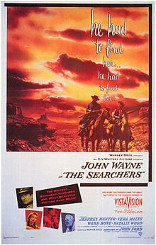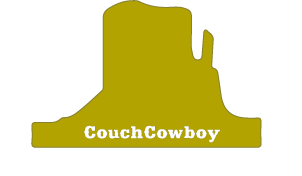 This Western represents the 12th pairing of John Ford and John Wayne, and it displays the exceptional and seasoned skills of both director and actor. The Searchers is always considered one of Ford's best directorial efforts and usually Wayne's best acting performance. Wayne often acknowledged that Ethan Edwards was his favorite role and the work he was most proud of. Those who are adamant that John Wayne cannot act should watch The Searchers. Any lover of Westerns or American cinema in general should view and review this movie.
This Western represents the 12th pairing of John Ford and John Wayne, and it displays the exceptional and seasoned skills of both director and actor. The Searchers is always considered one of Ford's best directorial efforts and usually Wayne's best acting performance. Wayne often acknowledged that Ethan Edwards was his favorite role and the work he was most proud of. Those who are adamant that John Wayne cannot act should watch The Searchers. Any lover of Westerns or American cinema in general should view and review this movie.
Wayne's character Ethan and the obsessive hatred that motivates his endless quest is the central, driving force of this film. The movie's first image, after the camera moves through the doorway and looks out onto Monument Valley, is of Ethan, the lone rider, approaching his brother Aaron's ranch after a long absence. "Ethan?", Aaron asks, for the movie's first word. Ethan. He arrives under mysterious circumstances after an unexplained absence. The movie opens, "Texas, 1868". Ethan fought for the Confederacy in the Civil War, but didn't surrender as he informs the Reverend/Captain. "Why didn't you come home before now?" his nephew asks. We get many and varied clues to Ethan's background during the first moments of the movie. He is undoubtedly one of the Westerns most unusual 'heros', probably an early 'anti-hero'. His confederate past and postwar criminal record link him to Jesse James and the cult of the populist outlaw. He comes from the Juarez/Maximillian war where he was a mercenary gunfighter. We will learn that he was a cavalryman (for the South) a Texas Ranger and an Indian-fighter. Ethan thus combines attributes of nearly all the heroic stereotypes developed in Westerns since 1939. (Slotkin) Behind Ethan lies two essentially unresolved conflicts, the American and Mexican civil wars. This immediate background only partially explains his torn character.
Ethan is in love with his brother's wife, Martha, and, evidently, she with him. This separated and mutually unrequited love is displayed in only a few moments of beautifully subtle gestures and glances. The romantic frustration and longing adds another layer to the complexity of Ethan's character and fuels his motivation for later action. Ethan also despises Martin, the part-Indian boy who his brother has adopted. The Reverend/Ranger Captain wonderfully played by Ward Bond confronts Ethan with equal measures of respect and worry, noting that he "fits a lot of descriptions..." Ford's providing us with so much complicated information in such a short time at the film's outset is one of many hallmarks of this masterpiece.
The Searchers is another of Ford's Monument Valley Westerns, the one in which he uses this hauntingly beautiful landscape to its fullest effect. John Ford shot this movie, and most of his Westerns, on location in the Valley, cast and crew living in tents and eating from chuckwagons. Monument Valley in the 1950s was still quite remote, in fact, the place furthest from any railroad lines in the continental United States. Many of the traditional John Ford company worked on The Searchers, including Ford's son Patrick producing, his son-in-law Frank Nugent writing, and John Wayne, his son Patrick, Ward Bond and Harry Carey, Jr. acting. In keeping with the family In keeping with the family atmosphere, the young Debbie is actually played by Natalie Wood's younger sister Lana. All these people lived and worked together for months out in the heat and dust of the West. John Wayne once said that making a Ford Western was like living in the Old West. (Ebert) This authentic, community approach to movie-making shows in the resulting quality of The Searchers.
The movie overall, like Ethan's character, is beautifully ambiguous, amazingly so by 1950s (and Westerns) standards. As we follow Ethan and Martin's endless quest and discover Ethan's ugly agenda, the ending becomes increasingly impossible to predict. The Searchers can be considered an early revisionist Western in that it offers a less one-dimensional view of Indians. The film presents a particularly challenging view of the 'Indian Wars' waged by white settlers and the cavalry. Many youngsters viewing the movie today neglect to place it in historical context and readily identify it, and thereby Ford and Wayne, as racist. Such a view is what I choose to call 'liberal-reactionary' nonsense. Taken in the context of its time, The Searchers presents a thoughtful view of race, racism and Native-American genocide. One could easily make the argument that the perspectives on these issues in The Searchers are decidedly more enlightened and nuanced than such later, clearly revisionist efforts as Dances with Wolves which is often blatantly patronizing in its treatment of Native-Americans. Roger Ebert points out that The Searchers was made in the dying days of the 'classic Western' which waned when Indians ceased being typecast as "savages".
Indeed, The Searchers marks the beginning of revised views. Such a shift in treatment may have caused the eventual demise of the Western. As Ebert notes, "the Western audience didn't want moral complexity; like the audience for today's violent thrillers and urban warfare pictures, it wanted action with clear-cut bad guys. It is also interesting to note that Ford presents challenging views of the cavalry and their role in the Indian Wars, after his more laudatory treatments in Rio Grande and She Tied a Yellow Ribbon (though Fort Apache, the other, and in my opinion the best, film in Ford's 'Cavalry Trilogy' tends to discredit the cavalry and particularly Custer...). Also, Ethan, the 'Indian Hunter' is not, as noted, wholly heroic. His rage and racism is unsympathetically shown for what it is. He has obvious parallels with the Comanche, Scar, his nemesis. Both have lost family to the other side; both are guided by revenge and hatred. It is true that Scar was not played by a Native-American and that Ford hired Navajo to play the Comanche. Certainly, these are strikes against him in matters of cinematic verisimilitude, but I contend they are nitpicking, particularly considering, again, that the movie was made in the 1950s.
It is likely that Ford was commenting not only on the post-Civil War Indian Wars in The Searchers, but also on the international Cold War and Civil Rights struggles of the 1950s. Many have contended that, along with other postwar revisionist Westerns, The Searchers rewrites the Western genre in response to the ideological struggles of the fifties. (Dagle) If so, Ford should be commended and not condemned for his treatment, taking it in historical context and not comparing it with today's hyper-politically correct standards. Besides, to dismiss -- or perhaps even at all to critique -- this movie on political grounds is missing the point. It is a movie, and a fine one. Watch the directing, the acting, the beautiful cinematography..
Enjoy one of the great Westerns ever made with both the director and leading actor performing at the height of their considerable powers.
The list of later films and directors influenced by The Searchers is notable and long. The plot line and specific shots were referenced in Star Wars. The rescuing quest and alienated hero is the acknowledged source for the story and themes of Martin Scorsese's Taxi Driver. The shots of the Ranger/Cavalry attack on the Comanche village at the end of the film are clearly mimicked in the helicopter attack scenes in Apocalypse Now. Ford's legacy and influence is readily heralded by all working directors. It is disappointing that most of today's young audience has little idea who John Ford is. It is worth noting that during Ford's lifetime, when his skills and accomplishments were universally acknowledged, The Grapes of Wrath was cited by consensus as the greatest American film. Today it is the more 'artistic' and sophisticated' Citizen Kane. However, at CouchCowboy, we still recognize and herald Ford and accordingly acknowledge The Searchers as an undisputed, enduring classic. "Put an Amen to it..."
--JED
Cast:
- John Wayne --- Ethan Edwards
- Jeffrey Hunter --- Martin Pawley
- Vera Miles --- Laurie Jorgensen
- Ward Bond --- Reverend Captain Samuel Johnson Clayton
- Natalie Wood --- Debbie Edwards
- John Qualen --- Lars Jorgensen
- Olive Carey --- Mrs. Jorgensen
- Henry Brandon -- Chief Cicatrice (Scar)
- Ken Curtis --- Charlie McCorry
- Harry Carey Jr. -- Brad Jorgensen
- Antonio Moreno -- Emilio Figueroa
- Hank Worden --- Mose Harper
- Beulah Archuletta -- Wild Goose Flying in the Night Sky
- Walter Coy --- Aaron Edwards
- Dorothy Jordan -- Martha Edwards
